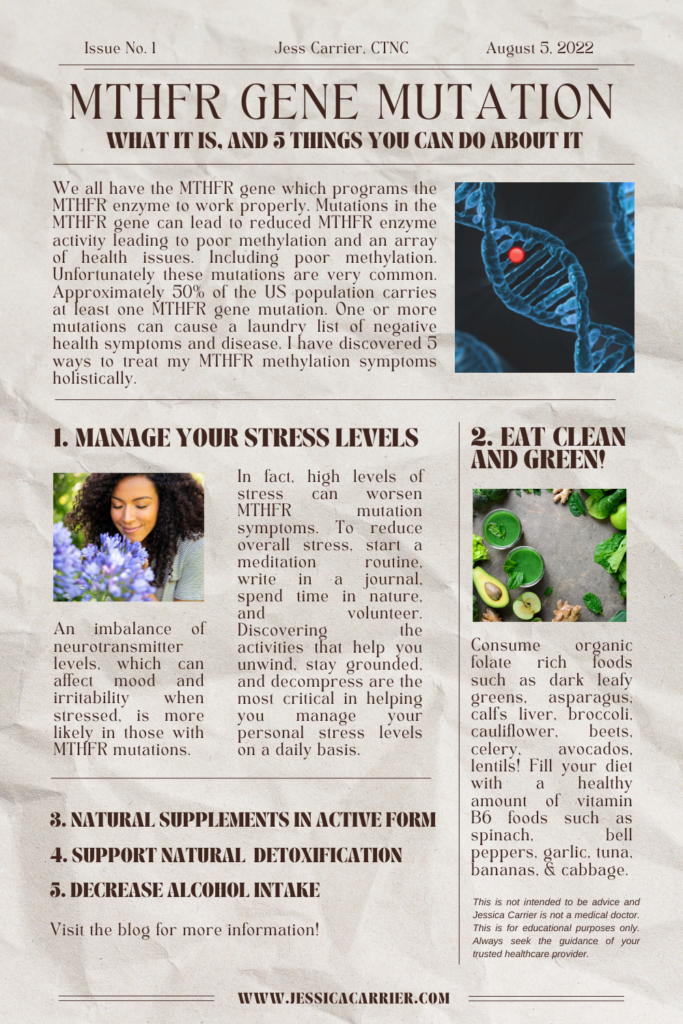MTHFR stands for methylenetetrahydrofolate reductase – a crazy long word!
The MTHFR enzyme in our body helps convert folate (B9) into its active form – 5-MTHF. It is involved in a process called methylation, which is crucial for detoxification from parasites, mold, chemicals and toxins.
We all have the MTHFR gene in our DNA that makes this happen. As a matter of fact, we each have two copies! One from our mother and one from our father.
An Deeper Look at The Methylation Process
The process of methylation is a chain reaction that involves bonding methyl groups to different molecules. These methyl groups turn one molecule into a totally different molecule with specific functions. When a methyl group is removed, it deactivates that function. For instance, MTHFR converts the folic acid found in food (vitamin B9) into folate by attaching a methyl group to it, which is the starting point for your methylation cycle.
One critical methylation process is converting homocysteine to methionine, which detoxifies your body, repairs cells, builds proteins, and helps with inflammation. Your liver then breaks down the methionine into an inflammation-fighting agent called SAM-e (s-adenosylmethionine), which helps to break down neurotransmitters and assist in repairing cells.
The most important thing to remember is that glutathione, your body’s most powerful detoxifier, is produced from methionine. So, if you can’t convert homocysteine into methionine, you’re stuck with low levels of glutathione and high levels of homocysteine and your body is left holding on to many toxins that you are exposed to, which can lead to neurological issues like ADHD, Autism, Anxiety, Depression, and an array of other health problems.
Where Things Go Wrong…
Now that you understand the MTHFR Gene and what it does in the body, I’m going to throw a wrench into the mix… In 1994, a scientist discovered two mutations of this gene (1).
It is debatable whether this is called a mutation or variant; however, the original abstract refers to them as mutations, so that is what we will stick with in this book.
Somewhere between 40 & 50 percent of the US population carries at least one MTHFR gene mutation.
Even just one mutation could mean that you may not get enough MTHFR enzyme action inside your body! As mentioned previously, without that enzyme doing its job, you could be stuck holding onto parasites, chemicals, mold, and other toxins like heavy metals which all roll out the red carpet for ADHD symptoms.
Food for thought.. One copy of my MTHFR gene holds one mutation, and from the beginning of this book, you know my struggle. If MTHFR is the culprit to all of my issues, imagine someone having both copies of their gene with two mutations each? What could that look like?
How to Discover if You Have an MTHFR Mutation
You can visit your healthcare provider to talk about testing options, or order a DNA test online yourself. You can also have your healthcare provider do a methylation pathway test, which analyzes five key methylation pathways, including cysteine, glycine, dopamine, serotonin, and methylation itself → this, I recommend (and what I did for my kids). I wouldn’t just “assume” you cannot detoxify properly even if you have a mutation of your MTHFR gene. With that said, Your DNA is still something very cool to take a look at, and it’s how I found that I personally had the mutation.
Signs that you might have an MTHFR mutation or that your body isn’t methylating properly could be hidden behind other conditions like poor response to supplements, fibromyalgia, and anxiety. You might also experience mood disorders and depression related to serotonin deficiency, increased allergies and asthma due to a lack of methylation, and increased risk of birth defects when pregnant due to DNA methylation issues.
I searched the web, and according to some medical doctors (2), some common symptoms of MTHFR Gene Mutation and poor methylation include:
- ADHD (Attention Deficit Hyperactivity Disorder)
- Autism – this one makes sense as it is proven that people with autism have difficulties detoxing from heavy metals (3). I haven’t found any studies that show everyone with autism, or a certain percentage of those with autism have MTHFR gene mutation, but I would love to know if that’s the case! To me, a simple first step would be to detox.
- Autoimmune disease and thyroid issues
- Cardiovascular disease
- Chronic fatigue
- Colon Cancer
- Digestive Issues, including IBS (Irritable Bowel Syndrome)
- Hormonal issues, including PCOS (Polycystic Ovary Syndrome)
- Migraines
- Schizophrenia
The Good News: Our Genes Are Not Our Destiny
Epigenetics is the study of gene expression and it has been another one of my favorite topics in my educational journey. Environmental changes such as diet, exercise, exposure to toxins, and medications can influence our genes and traits. Nutrition in particular, influences genetic expression. Which means, certain genes can be turned “on” or “off” like a light switch depending on what you eat. There are some steps you can take to decrease complications from having an MTHFR gene mutation.
According to research, it’s possible to aid your methylation process. Here are 5 things you can do.
Eat Clean & Green To Support Detoxification
Because poor methylation contributes to reduced detoxification, it’s important to support your body’s natural detoxification. Consume organic folate rich foods such as dark leafy greens, asparagus, calf’s liver, broccoli, cauliflower, beets, celery, avocados, lentils! Fill your diet with a healthy amount of vitamin B6 foods such as spinach, bell peppers, garlic, tuna, bananas, & cabbage.
Supplements
Pre-methylated B vitamins: For those who have MTHFR mutations, folate needs to be in its pre-methylated form (5 MTHF). Non-pre-methylated B vitamins are a waste for someone who cannot convert folic acid into, folate, and then into 5-MTHF. In theory, folic acid, a man-made chemical, could be very dangerous for those who struggle with methylation causing a buildup of folic acid.
Other supplements that support methylation include:
Magnesium, Vitamin D, and Glutathione.
Manage Stress With Lifestyle Changes
An imbalance of neurotransmitter levels, which can affect mood and irritability when stressed, is more likely in those with MTHFR mutations. In fact, high levels of stress can worsen poor methylation symptoms. To reduce overall stress, start a meditation routine, write in a journal, spend time in nature, and volunteer. Discovering the activities that help you unwind, stay grounded, and decompress are the most critical in helping you manage your personal stress levels on a daily basis.
Decrease Alcohol Intake
Alcohol intake increases detoxification demands on the liver. Methylation processes may already be impaired in those with MTHFR gene mutations, so only consuming alcohol in moderation or not at all is recommended by some doctors.
It’s worth noting that not all gene variants and mutations are created equal, and some may be more clinically significant than others. If you’re concerned about your MTHFR status, it’s best to consult with a qualified healthcare professional who can help guide you through the appropriate testing and treatment options.
- Goyette P, Sumner JS, Milos R, Duncan AM, Rosenblatt DS, Matthews RG, Rozen R. Human methylenetetrahydrofolate reductase: isolation of cDNA, mapping and mutation identification. Nat Genet. 1994 Jun;7(2):195-200. doi: 10.1038/ng0694-195. Erratum in: Nat Genet. 1994 Aug;7(4):551. PMID: 7920641.
- Parsley Health. (2018). MTHFR Mutation: How it Affects Your Health and What to Do. Parsley Health Blog. https://www.parsleyhealth.com/blog/mthfr-mutation/
- Jafari T, Rostampour N, Fallah AA, Hesami A. The association between mercury levels and autism spectrum disorders: A systematic review and meta-analysis. J Trace Elem Med Biol. 2017 Dec;44:289-297. doi: 10.1016/j.jtemb.2017.09.002. Epub 2017 Sep 4. PMID: 28965590.
I will update this article as I learn more. Be sure to check back frequently if you are on the MTHFR journey, or consider applying for health coaching with me for the latest education in holistic health.

This article and information provided by Jessica Carrier on this website and as part of her products is not meant to heal, diagnose, or treat any medical or mental illness. Jessica Carrier is not a medical doctor and the information contained in this article is meant to be educational. Jessica encourages you to do your own research and talk to your doctor before starting any diet or supplement regimen, as some foods and supplements can cause negative reactions with certain medications. The links contained in this article may be affiliate links and may not be. See the full disclaimer here.

